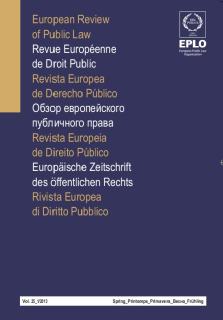
PUBLIC LAW AND THE ECONOMIC CRISIS
ROMANIA
LUCICA MATEI
Professor Dr., Faculty of Public Administration,
National School of Political Studies and Public Administration, Bucharest, Romania
ANI MATEI
Professor Dr., Faculty of Public Administration,
National School of Political Studies and Public Administration, Bucharest, Romania
CORINA GEORGIANA LAZĂR
Lecturer Dr., Faculty of Public Administration,
National School of Political Studies and Public Administration, Bucharest, Romania
The financial and economic crisis has revealed that the financial and economic systems worldwide are facing various challenges influencing the economic growth, labor market, etc. emphasizing the functional chain with its interfaces among the national and international financial systems. The preoccupation of the competent decision-making institutions, the International Monetary Fund (IMF), the World Bank (WB), the European Union (EU) for overcoming and countering the crisis, is found also in Romania through economic measures, specific for the crisis, taken by the Government, such as streamlining the expenditure, diversifying and increasing the sources of income, and making structural reforms in the social, financial field, healthcare and tax legislation. In making and implementing anti-crisis economic policies, the legal norms have been respected, as well as the standards specified in international instruments in the field of human rights, the principles of fundamental rights, the judiciary authorities (Con-stitutional Court of Romania), the civil society and international community playing an important role.
La crise économique et financière a révélé que les systèmes financiers et économiques de par le monde étaient confrontés à des défis divers qui influent sur la croissance économique, le marché du travail, etc., en mettant en avant la chaîne fonctionnelle et ses interfaces parmi les systèmes financiers nationaux et internationaux. La préoccupation des institutions de décision compétentes, le Fonds monétaire international (FMI), la Banque mondiale (BM) et l'Union européenne (UE), de dépasser et contrer la crise, se retrouve en Roumanie à travers les mesures économiques prises par le gouvernement spécialement en raison de la crise, telles que la réduction des dépenses, la diversification et l'accroissement des sources de revenus, les réformes structurelles dans le domaine social et financier, la santé et la législation fiscale. Dans la conception et la mise en œuvre des politiques économiques anti-crise, les normes légales ont été respectées, de même que les standards prévus dans les instruments internationaux en matière de droits de l'homme, les principes des droits fondamentaux, les autorités judiciaires (Cour constitutionnelle roumaine), la société civile et la communauté internationale jouant un rôle important.





















